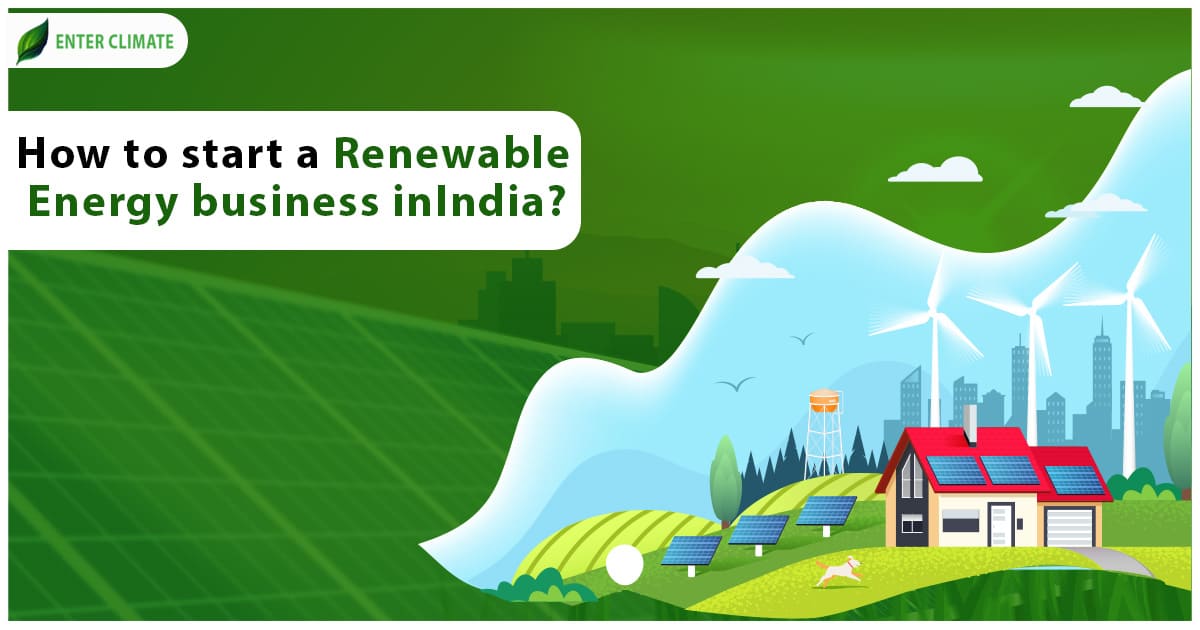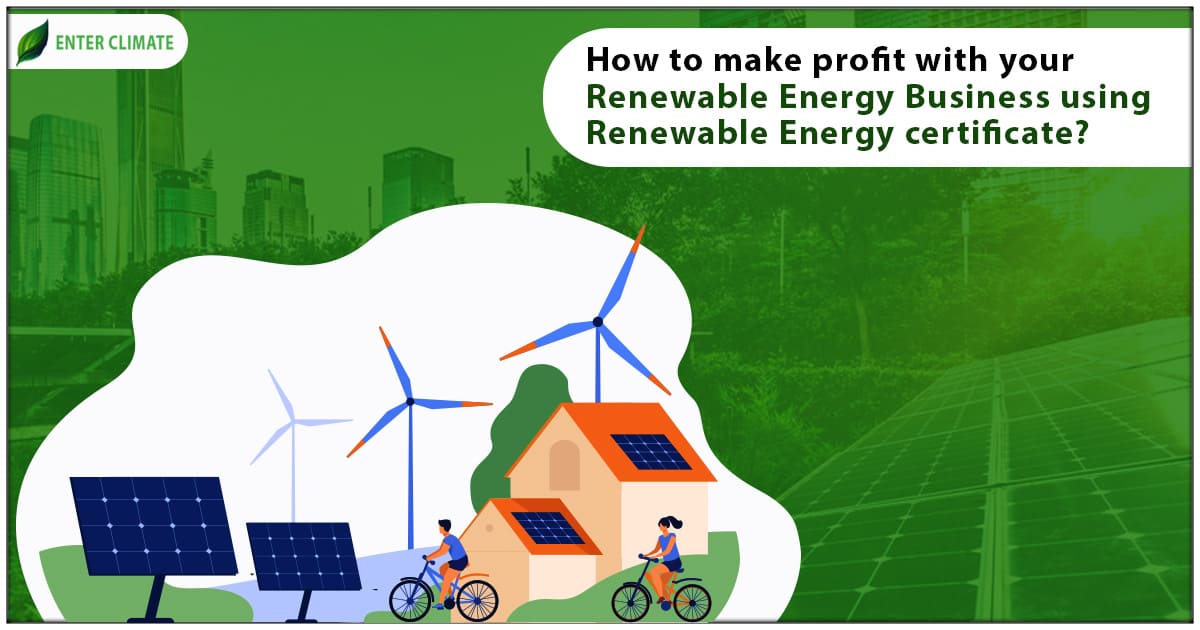How to start a Renewable Energy business in India?
 26 May, 2023
26 May, 2023 
With more than 1.4 billion population, India has a massive demand for energy for its rapidly growing economy. Since the time of Independence, efforts to make India energy-independent have continued. Today India’s Renewable Energy production capacity is experiencing significant growth. Considering the sustainable development goals (SDG), power generation mix of India is rapidly shifting towards a more substantial share from renewable sources. Today, India is the world’s third largest producer of power from renewable sources, with 40% of its installed electricity generated coming from non-fossil fuel sources. There is also continuous government assistance towards research and development and providing a favourable environment to set up captive power generation and manufacturing units that manufacture the machinery and equipment needed by these units. Central and state governments are actively assisting green entrepreneurs in setting up renewable energy generation plants such as wind power plants, solar power plants, bioenergy generation plants etc. and in the way, reduce the dependence on the import of equipment for this Renewable Energy business, presenting a promising opportunity for aspiring entrepreneurs.
Regulations governing Renewable Energy production, transmission and distribution
The Central as well as the state government have the right to formulate laws on electricity as this subject features in the concurrent list of the constitution of India. At present, there are no specific legislation for renewable energy in India.
- The principal legislation that regulates the electricity sector is the Electricity Act 2003. Since renewable energy (RE) is part of the electricity sector, the provisions of the Electricity Act are applicable on this sector, which provides a framework for the generation, distribution, trading, transmission and use of electricity.
- The Act also requires the GOI to publish a National Tariff Policy, first issued in 2006 and revised in 2016. The National Tariff Policy 2016 emphasised the promotion of Renewable Energy business and encouraged private sector participation in setting up renewable energy plants.
- These policies provide benefits such as easier land acquisition for setting up RE projects, faster conversion of land use for the development of RE projects, preferential allotment of evacuation capacities, preferential procurement of renewable power by state distribution licensees, and hassle-free transmission infrastructure.
- Central Electricity Regulatory Commission (CERC) has also notified the Regulation on Renewable Energy Certificate (REC) to promote renewable energy business and the development of the market in electricity generation. The framework of REC is expected to give a push to RE capacity addition in the country.
Stages in setting up any Renewable Energy Project
To start a renewable energy project in India, consider the following steps must be considered:
Market Research and Feasibility Study: Conduct thorough market research to identify renewable energy opportunities in India, including solar, wind, biomass, hydropower, or other forms of clean energy. Assess the market demand, potential competitors, government policies, and financial incentives available in the renewable energy sector.
Business Plan Development: Create a comprehensive business plan outlining your objectives, target market, revenue models, financial projections, and marketing strategies. Identify the specific niche within the renewable energy sector that you intend to focus on.
Financing and Funding: Determine the capital requirements for your renewable energy business and explore various financing options, such as loans from banks, venture capital, or government subsidies. Seek partnerships or collaborations with investors, financial institutions, or renewable energy project developers to secure the necessary funding.
Site Selection and Resource Assessment: Identify suitable locations for your renewable energy projects, such as areas with high solar irradiation, wind speeds, or biomass availability. Conduct resource assessments to determine the potential energy generation capacity and feasibility of your projects.
Technology Selection and Equipment Procurement
Choose the appropriate renewable energy technology for Renewable Energy business and resource assessment. Procure reliable and high-quality equipment, such as solar panels, wind turbines, biomass digesters, or hydropower turbines, from trusted suppliers.
Legal and Regulatory Compliance: Understand and comply with the legal requirements for setting up a renewable energy business in India. Obtain necessary licenses, permits, and clearances from relevant government bodies, such as the Ministry of New and Renewable Energy (MNRE) and State Electricity Regulatory Commissions (SERCs)[1].
Project Development and Implementation: Develop a detailed project implementation plan, including engineering design, construction, and installation of renewable energy systems. Collaborate with contractors, engineers, and consultants to ensure the timely and efficient execution of your project.
Operations and Maintenance: Develop an operations and maintenance plan to ensure the smooth functioning of your Renewable Energy business setup. It is crucial that the entrepreneur must regularly maintain and monitor the working of equipment, perform repairs and optimise energy generation to maximise efficiency.
Marketing and Business Development: A solid marketing strategy to promote the business and attract customers or investors must be done regularly to expand the business. The entrepreneur can participate in industry conferences, trade shows, and networking events to build connections and increase visibility within the renewable energy sector.
Continuous Learning and Adaptation: Even after the successful setup, the entrepreneur must stay updated on the latest technological advancements, market trends, and policy changes in the renewable energy industry. Continuously improving and adapting your business strategies and technology to remain competitive and capitalise on emerging opportunities is recommended.
Licenses Approvals Needed for Renewable Energy relate Projects
Different types of renewable energy businesses require different types of licences. However, there are a few standard licences, approvals and documents required, include
- Company Registration
- Registration with the REC
- Articles of Association and Memorandum of Association
- GST Registration
- MSME Registration
- Pollution NOC from SPCB/PCC
- Permanent Account Number (PAN)
- CEIG Approval
- Factory Licence
- Fire NOC
Other Renewable Energy Related Business Ideas
If you want to explore other business opportunities that in not related to power generation but manufacturing of equipment, parts, components, and spare used in the Renewable Energy business, you can also explore the following manufacturing-related business
- Photovoltaic modules/ solar panels
- Power Inverters for use in Photovoltaic Power Systems
- Solar cells
- Solar water pump
- Biomass dryers
- Storage Batteries for SPV Applications
- Wind Turbines and generators
- Electrolyser for green hydrogen production
- Capacitors for solar applications
- Solar Lantern, Solar Home Lights
- Energy Storage devices such as high-energy lithium-ion and sodium-ion batteries, Redox Flow Batteries
- Power Electronic devices such as voltage Converter, PV Inverters etc
- Biomass Gasification units
- Biomass Pelletisation and torrefaction plants
- Biomass Briquette manufacturing machines
Government Assistance for Renewable Energy Business for Indian Entrepreneurs
Financial Assistance: Ministry of New & Renewable Energy (MNRE) provides up to 100% financial support to Government/non-profit research organisations/ NGOs and up to 50% to 70% to industry. The Renewable Energy Research and Technology Development (RE-RTD) Programme budget is Rs. 228 crores for FY 2021-22 to 2025-26.
Other schemes related to the development of the Renewable Energy sector include
- Pradhan Mantri Kisan Urja Suraksha Evam Utthaan Mahabhiyan (PM-KUSUM) for decentralised solar
- Roof Top Solar (RTS) Programme Phase-II
- Central Public Sector Undertaking (CPSU) Scheme for Grid-Connected Solar Photovoltaic (PV) Power Projects
- Development of Ultra Mega Solar Power Projects
- PLI Scheme: ‘National Programme on High-Efficiency Solar PV Modules.
- National Green Hydrogen Mission and Development of Green Energy Corridors
Skill Development Projects for creating workforce and Training of Entrepreneurs: Human Resource Development (HRD) portal has been developed to institutionalise renewable energy education and training to meet the requirement of qualified and trained manpower in the country. Beneficiaries can submit online applications/proposals for short-term training and skill development in renewable energy through this portal.
Market Potential for Renewable Energy Generation Sector
As per the updated Nationally Determined Contributions (NDC), India now stands committed to achieving about 50 % cumulative electric power installed capacity from energy resources based on non -fossil fuels by 2030. The India renewable energy market reached 20 Billion USD in 2022, and as per some reports, the market is expected to reach US$ 35.6 Billion by 2028, with a CAGR of 10.19% during 2023-2028.
So far, a total of 167.75 GW Renewable Energy capacity has been installed in India, and we are now ranked 4th globally in renewable energy installed capacity, 4th in wind power capacity & 4th in solar power capacity (as per REN21 Renewables 2022 Global Status Report). Further, projects of 78.75 GW capacity are under various stages of implementation, and 32.60 GW capacity are under different bidding stages.
Conclusion
Starting a Renewable Energy business in India requires careful planning, adequate financing, adherence to regulatory requirements, and a deep understanding of the renewable energy sector. Solar energy-based applications have benefited millions of Indians by meeting their cooking, lighting and other energy needs in an environment-friendly manner. Having achieved large-scale success in solar energy solutions. Biomass has also been an essential source of energy for India. It is renewable, carbon-neutral, widely available, and has the potential to provide significant opportunities in rural areas. India has co-fired biomass in thermal plants under its biomass power/co-generation programme. Today over 800 biomass power and bagasse/non-bagasse projects have been installed in the country for feeding power to the grid. By leveraging the abundant renewable energy resources available in the country, entrepreneurs can contribute to India’s vision of becoming the leader in renewable energy production.
Read our Article: How To Start The Readymade Garments Manufacturing Unit?












